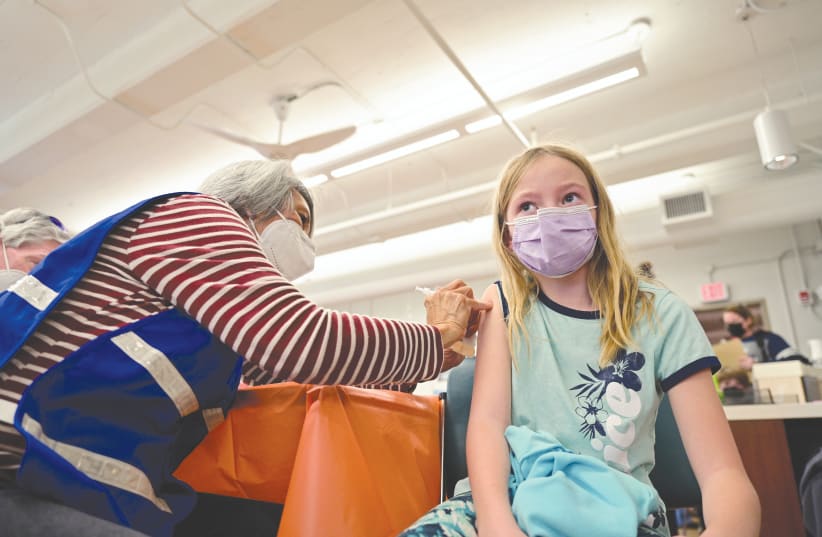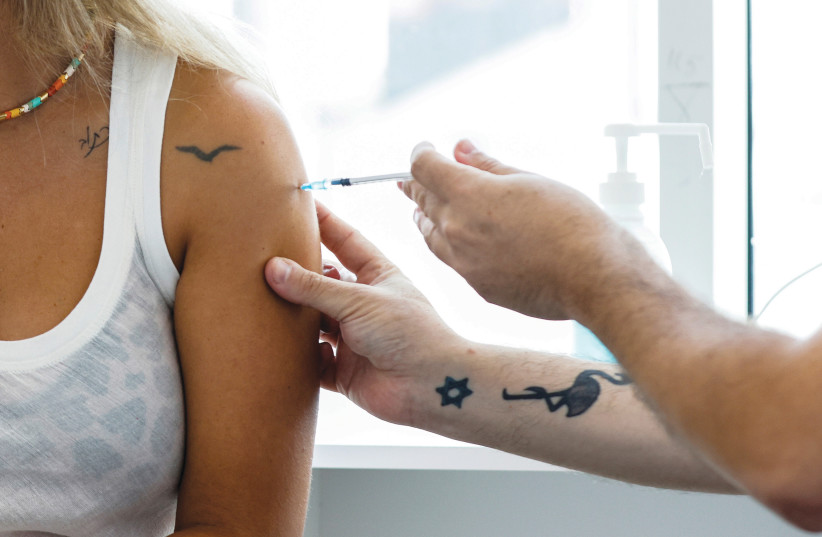Health funds on Sunday began booking appointments to vaccinate children aged 5-11 who will start to get their jabs on Tuesday, as Prime Minister Naftali Bennett warned that the country appears to be on the verge of a coronavirus “children’s wave.”
“In recent days we have been witnessing a serious wave of morbidity hitting Europe, and we are also seeing a certain increase in the coefficient of infection here, in Israel,” Bennett said at the start of the weekly cabinet meeting.
“Winter is starting and we are on the verge of what appears to be a wave of morbidity among children,” he noted. “Luckily, we kept our finger on the pulse even when the trend was positive, so we are prepared.”
Currently, Israel has 5,295 active cases. In the past month, about a third of the new cases identified were children aged 0-9 and another 27% were registered in 10-19 age group.
A batch of Pfizer vaccines for children were delivered to Israel on Saturday. The vaccine is slightly different than the one for adults: it is administered in dosages of 10 mg. as opposed to 30 mg., and is kept in different vials.
Also on Sunday, the experts’ advisory committee of experts supporting the Health Ministry on the topic of coronavirus vaccines confirmed that the two shots should be administered at an interval of three weeks as it has been done so far with older individuals. The question has been debated in the past few weeks since some studies suggest that a longer period could boost vaccine efficacy.
Clalit, Maccabi and Leumit health services announced that parents begin making appointments from Sunday afternoon. A few hours later, Maccabi said that more than 3,600 children had been registered.
“Vaccines are safe and effective in keeping our children healthy,” Bennett said. “As I said, my son, David, will be one of the first to get vaccinated, and this is what I expect all Israeli parents to do, certainly from the government ministers who have children or grandchildren of the relevant age.”
Speaking to Kan Bet radio, Head of Public Health Services, Dr. Sharon Alroy-Preis, said she believed that the response among parents will be good, in spite of some surveys that suggest the opposite.
“It makes sense that some of the population is undecided and wants more data,” she said.
Government and health officials hope that the vaccination for the ages 5-11 – about 1.23 million individuals in Israel – will help prevent another increase in morbidity as for the first time since September, the numbers appear to be on the rise.
As of Sunday, the average number of new daily cases registered in the previous week had been 454, compared to 443 on the week before.
On Saturday, 230 new virus carriers were identified, but with a much lower number of tests processed compared to weekdays – around 30,000 compared to 80,000.
On Friday, for the first time in two months, the coronavirus reproduction rate (R) climbed above 1, and as of Sunday it still stood at 1.02.
The R rate represents how many people each virus carrier can infect on average and it only mirrors the situation of about 10 days earlier.
When the R stands above 1, the disease is considered to be spreading because every case generates more than one case. When it is below 1, it is a sign that the number of cases is declining.
“In light of the current situation, no further easing of restrictions is expected in Israel at this stage,” Bennett said. “Israel is open and safe, and we will work to ensure that this continues.”
A coronavirus cabinet meeting was convened for Tuesday night to discuss the situation.
Commenting on the fact that morbidity in Israel has stopped decreasing, Alroy-Preis said that the country still has a significant number of people not vaccinated, who make up the vast majority of new cases, as well as of patients in serious condition.
Some 76% of cases identified last week were not vaccinated in addition to another 12% who were inoculated more than six months ago.
In a press briefing on Sunday, Bennett said that there are about 950,000 individuals over age 12 who have still not received their first dose and a similar number who still have not had a booster.
He added that Israel is working on purchasing the new anti-COVID medications by Pfizer and Merck, as well as already providing the medical treatment that helps at-risk patients avoid developing serious symptoms (Regeneron).
However, he noted that people who are not willing to receive a vaccine are often refusing also the treatment.
As of Sunday, there were 131 patients in serious condition, 101 of whom were not vaccinated, six were vaccinated more than six months ago and 14 were fully vaccinated.
Some 6.26 million Israelis have received at least one dose of the vaccine, 5.7 million at least two and 4.04 million have had the booster shot.
Also on Sunday, the ministry’s advisory committee recommended the booster also for children 12-15 years of age starting five months after the second shot, according to the protocol already followed for older individuals.

